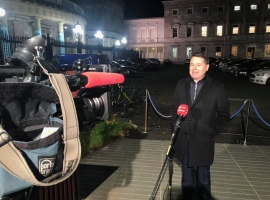
Ireland's labour market has more spare capacity than official jobless numbers indicate, a study by two central bank economists showed on Wednesday, suggesting potential for a further fall before major wage pressures emerge.
Ireland's economy has grown faster than any other in the European Union for the last three years and is showing few signs of slowing down, prompting policymakers to warn that it could overheat in the coming years.
It did this to devastating effect in the lead up to the financial crash around 2008.
But if wage pressure holds off, the risk of such overheating diminishes. Overall inflation was minus 0.2% at the end of July.
The government, central bank and independent fiscal watchdog all agree that although unemployment has fallen sharply to 6.4%, the economy is not overheating at present with inflation flat and annual wages growing at a steady 1.4%.
The research on Wednesday calculated that there was a higher level of labor underutilisation than suggested by the standard unemployment rate which only includes individuals who are actively looking for work and are available to start imminently.
When part time workers willing to work more hours and all non-employed individuals, such as those who stopped searching for work following Ireland economic crisis a decade ago, are added the central bank economists said Ireland had a non-employment rate of 9.4% at the end of 2016.
"Our analysis suggests that there may be some scope for the unemployment rate to fall further before significant wage pressures emerge, but labor supply conditions are tightening as a strong recovery continues," the study said.
"A high degree of labor underutilisation indicates that the economy could continue to grow strongly without an immediate risk of overheating."
Similar research from the European Central Bank (ECB) in May suggested that labour market slack across the euro zone stood at around 15% at the time, well above the official 9.5% unemployment rate and explaining why wage growth has been unexpectedly weak.
Irish Central Bank Governor Philip Lane said last month that Ireland may need to cool parts of its economy in a couple of years time, potentially by raising taxes, if the fast-growing economy reaches full employment.
Full employment means that just about everyone who wants a job has one, a situation which leads to workforce shortages and wage inflation. (Reuters)
Source:www.businessworld.ie
















